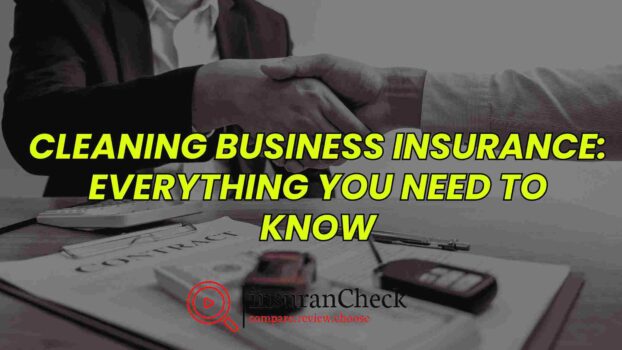You’ve started a cleaning business, that’s great! But have you considered the risks? What if you break something or someone gets hurt? Cleaning business insurance is crucial here. It acts as a safety net. Interestingly, 40% of small businesses might fail without insurance. Shocking, right? So, let’s discuss how to protect your business and keep it stress-free.
What Is Cleaning Business Insurance?
Cleaning business insurance protects your business from financial risks in cleaning services. This includes homes, offices, or commercial spaces. It covers accidents, damages, or lawsuits. For example, if you break a client’s vase while cleaning, insurance covers the cost. Without it, you’d pay out of pocket. Essentially, this insurance acts as a safety net for unexpected expenses.
Best Insurance For Small Businesses
Who Needs Cleaning Business Insurance?
Cleaning businesses tackle various jobs, from carpets in homes to entire office buildings. Regardless of the task, the right insurance is vital. It shields you from unexpected costs. Here’s who benefits from cleaning business insurance:
- House cleaners
- Office cleaners
- Janitorial services
- Commercial cleaners
- Carpet cleaners
- Window cleaners
- Furniture cleaners
- Pressure washing services
- Dry cleaners
- Laundry services
If you’re in any of these categories, insurance protects your business from costly errors!
What Insurance Does a Cleaning Business Need?
Running a cleaning business involves risks. These arise from working in homes, offices, or factories. Proper insurance is vital to avoid financial losses. The type of insurance needed depends on your business size, equipment, services, and whether you use vehicles or have an office. Here’s a simple guide to the essential insurance types:
General Liability Insurance
This is a must for every cleaning business. It covers property damage, bodily injury, and personal injury. For instance, if an employee breaks a vase or damages a carpet, this insurance pays for repairs. It also covers injuries, like a client slipping on a wet floor. Without it, your business could face crippling legal and medical costs.
Business Owners Policy (BOP)
A BOP is ideal for cleaning businesses. It combines several insurances at a lower cost. Typically, it includes general liability and property insurance. This covers your cleaning tools and office space. For example, if a fire damages your supplies and office, a BOP helps cover costs. However, it doesn’t cover vehicles or employees, so you’ll need extra policies for those.
Commercial Auto Insurance
If you use company vehicles, this insurance is necessary. Personal insurance won’t cover business-related accidents. Commercial auto insurance protects your vehicle and driver. For example, if an employee crashes while driving to a client, this insurance covers repairs and medical costs. Even with one company car, having the right insurance is crucial.
Workers’ Compensation Insurance
This insurance is legally required for businesses with employees in most states. It’s vital for cleaning businesses due to the physical risks involved. It covers medical bills, rehab, and lost wages for injured workers. It also protects your business from lawsuits. For instance, if an employee is injured by cleaning chemicals, this insurance covers their treatment. It ensures employee care and shields your business from legal claims.
Professional Liability Insurance (Errors & Omissions)
This insurance protects against claims of inadequate services. It’s vital for businesses offering specialized cleaning. For example, if a client claims your service didn’t meet standards, this policy covers legal fees and settlements. It offers peace of mind in a high-expectation industry.
Umbrella Insurance
This is an extra layer of protection, it kicks in when your other policies reach their limits. For example, if your liability coverage is $1 million and a claim is $1.5 million, umbrella insurance covers the extra $500,000. It’s valuable for businesses in high-risk areas or with large clients.
Bonding Insurance
This insurance is often required by clients, especially in commercial cleaning. It ensures your business meets its obligations. If you fail to deliver, it compensates the client for losses. This boosts your business’s credibility.
Cyber Liability Insurance
If you manage client information online, this insurance is crucial. It covers costs related to data breaches. For example, if your database is hacked, this insurance covers legal fees and credit monitoring for clients.
Having the right insurance is key to your cleaning business’s success. It protects equipment, covers legal claims, and ensures employee safety. With proper coverage, you can focus on growing your business and reducing risks.
What’s Not Covered by Cleaning Business Insurance?
Cleaning business insurance is vital, but it doesn’t cover everything. Policies have exclusions and limits. Knowing what’s not included prevents surprises. Here are common exclusions in cleaning business insurance.
- Fraudulent and Intentional Acts
- Government Seizures
- Earthquakes
- Floods
- Infectious Diseases
- Wrongful Termination
How Much Does Cleaning Business Insurance Cost?
Knowing the cost of cleaning business insurance helps with budgeting. On average, it costs about $520 a year or $43 a month.
- Cost Breakdown:
- Less than 25% pay under $500 a year.
- About 69% pay between $500 and $1,000.
Costs vary based on business size, services, and coverage. For example, specialized services or more employees mean higher costs. Always compare quotes to find the best, affordable coverage.
Conclusion
Starting a cleaning business is exciting but comes with risks. Accidents and injuries can happen. So, having the right insurance is key. It protects your business and lets you focus on cleaning.
Don’t leave your business at risk. Get a quote now for the best insurance. Safeguard your future!












